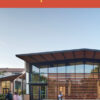Recently, a good friend and mentor, Marie Farrell, Hon. AIA, passed away. During her 25-year tenure as Executive Director of AIA San Francisco, Marie left a legacy of lasting civic contributions, professional achievements, and many devoted friends. Perhaps her greatest legacy, at least for me, was to be a role model of a life well spent.
When I joined AIA California Council, Marie was the first to welcome me. She explained all the acronyms, introduced me to the stakeholders, and constantly reassured me I had embarked on the greatest adventure of my life. Her gentle nature and infectious smile opened many a mind and heart to the value of design. Her counsel shaped my career and my life.
Among the many memories I have of Marie, I remember most the way she treated people. She was kind. She inspired others by her thoughtfulness. In fact, I can’t recall any time she said something disparaging about another person.
Marie lived the words of my father. Time and experience, he said, would demonstrate that “most things are not always what they appear to be. Your life will be better if you believe none of what you hear and half of what you see. “
During this time of celebration with family and friends, I find myself thinking about Marie and reflecting on what I see is a disturbing trend—the erosion of good manners and civility. I see it in the firestorms that erupt when communication breaks down, a breakdown that happens all-too-often when we’re not in possession of all the facts.
It’s easy to take at face value what we see, hear, or read. We’re too busy to carefully weigh and evaluate information that streams across our desk.
Yes, the constant flood of e-mails is tiresome. Sifting facts and getting to the bottom of an issue is time consuming and exhausting. So instead of opening the folder marked “priority” and reading all the way down to the final sentence, we default to initial impressions or preconceptions of the motives of others. Is that a trait of effective leadership?
Is a lack of civility the mark of a leader? Instead of picking up the phone when there’s a question or issue with someone, how many of us fire up the laptop, compose a nastygram, and hit “send all”?
Maybe the virtual world has made us so isolated that being rude and hurtful doesn’t seem quite so hard to do. How often do we rush to anger, find someone on which to focus this anger, and then inform the universe regarding another’s misstep, intentional or not? Why is it so easy to assume the worst of others unless proven otherwise?
Yet, in the end, the mark of leaders is how we treat others. It defines our character and our humanity. Is raising our voice, name-calling, or engaging in verbal assault ever warranted? Does something written or said in anger ever solve a problem or simply scar effective working relationships, often for life?
Volunteerism and the contributions of a hard-working staff are the fuel that runs every part of this organization. Well-spoken words can galvanize, encourage, and excite efforts for good; words can also demoralize, demean, and sow seeds of despair.
Marie Farrell now joins the memories of the many good men and women who shaped my life. I still see their faces and hear their voices. What I don’t hear or recall is an instance or a situation where the leaders that mentored my behavior were rude to others.
Realizing that service to the members is built on strong relationships, maybe all of us can recommit ourselves to being civil and respectful to each other, not as an exception, but the rule. It’s something to think about during the quiet hours of reflection the season brings.
Readers of Paul Welch’s original post on AIA Forum responded with these thoughts:
I’d also like to put in a plug for a good sense of humor (not mean humor) that helps each day become more enjoyable. Even in the darkest hour, there is usually something to be grateful for and for some of us to find ironically funny. Humor is what keeps me going.
We all need to stop now and then and remember to breathe, pause and put things into perspective. We only have the moment we are living in. We need to learn from the past but let go. We can hope for better days, but nothing is certain. If we are kind now to those around us and appreciate that we are not in a war zone, not starving to death, not dying of cholera, we can find peace, hopefully all year long.
Katherine Austin, AIA, is an architect in Sebastopol, California, all of whose current clients are implementing Build it Green, a California Green Building program that utilizes third party verification. She is past president of AIA Redwood Empire, past chair of the national AIA Residential Advisory Group, and former mayor of Sebastopol.
“Maybe the virtual world has made us so isolated that being rude and hurtful doesn’t seem quite so hard to do.”
I am convinced this is a root cause of this phenomenon. I saw it first in our youngest generation of “texters.” The ability to say anything, no matter how harmful, because they were not actually looking into the others person’s eyes when they said it. The ability to excuse ourselves from the hurt and anger people cause in disrespectful and unmannerly comments is a key reason we have lost some civility. Now I see it spreading to all areas of communications, all ages, and all demographics.
We in this country have begun to believe we are not responsible for our actions, regardless of if they cause pain to ourselves or others. We have been led to believe that it is always “somebody else’s fault.”
The reality is that humanity is based on good manners, care and concern for others, honesty, and always trying to do the right thing. I talk about this to my young children, and I talk about it to my staff. Not exactly as simple as bad karma and good karma, but that is not a bad place to start.
I have taught myself to not immediately respond to something I am angry about, and, if I do write a response, I always hold it for later reading. I find more often than not that, if I do not delete it entirely, I almost always modify it. We talk a lot here about the power of a personal phone call. E-mails are so easy, but they are one-way conversations that do little to identify and resolve problems, especially when there are personal feelings involved.
Life is a “one-time” opportunity. If we fail to do well, there are no do-overs. I remind myself of that constantly, and it helps me when I get mad or frustrated.
Bruce Monighan has been the principal of a small practice for 30 years and an AIA member for 38 years. Active in leadership at the AIA Central Valley and the AIACC, he currently serves as AIACC Secretary Treasurer. Bruce Chairs the AIACV Public Policy Committee, serves as the AIACV representative on the Sacramento Region Builders PAC, and has been active in streamlining of public policy and the creation of public policy initiatives that support sustainable design and the architect’s role in designing communities.
Paul W. Welch, Jr., Hon. AIA, is Executive Vice President of the AIA California Council.
Originally published late 2012, in arcCA 12.1, “On Good Behavior.”





